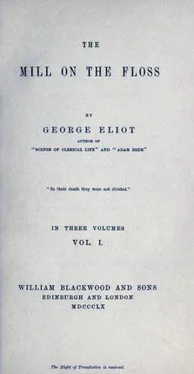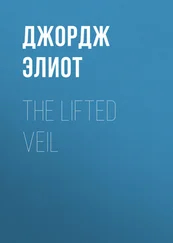When Maggie came, however, she could not help looking with growing interest at the new schoolfellow, although he was the son of that wicked Lawyer Wakem, who made her father so angry. She had arrived in the middle of school-hours, and had sat by while Philip went through his lessons with Mr. Stelling. Tom, some weeks ago, had sent her word that Philip knew no end of stories, — not stupid stories like hers; and she was convinced now from her own observation that he must be very clever; she hoped he would think her rather clever too, when she came to talk to him. Maggie, moreover, had rather a tenderness for deformed things; she preferred the wry-necked lambs, because it seemed to her that the lambs which were quite strong and well made wouldn't mind so much about being petted; and she was especially fond of petting objects that would think it very delightful to be petted by her. She loved Tom very dearly, but she often wished that he cared more about her loving him.
"I think Philip Wakem seems a nice boy, Tom," she said, when they went out of the study together into the garden, to pass the interval before dinner. "He couldn't choose his father, you know; and I've read of very bad men who had good sons, as well as good parents who had bad children. And if Philip is good, I think we ought to be the more sorry for him because his father is not a good man. You like him, don't you?"
"Oh, he's a queer fellow," said Tom, curtly, "and he's as sulky as can be with me, because I told him his father was a rogue. And I'd a right to tell him so, for it was true; and he began it, with calling me names. But you stop here by yourself a bit, Maggie, will you? I've got something I want to do upstairs."
"Can't I go too?" said Maggie, who in this first day of meeting again loved Tom's shadow.
"No, it's something I'll tell you about by-and-by, not yet," said Tom, skipping away.
In the afternoon the boys were at their books in the study, preparing the morrow's lesson's that they might have a holiday in the evening in honor of Maggie's arrival. Tom was hanging over his Latin grammar, moving his lips inaudibly like a strict but impatient Catholic repeating his tale of paternosters; and Philip, at the other end of the room, was busy with two volumes, with a look of contented diligence that excited Maggie's curiosity; he did not look at all as if he were learning a lesson. She sat on a low stool at nearly a right angle with the two boys, watching first one and then the other; and Philip, looking off his book once toward the fire-place, caught the pair of questioning dark eyes fixed upon him. He thought this sister of Tulliver's seemed a nice little thing, quite unlike her brother; he wished he had a little sister. What was it, he wondered, that made Maggie's dark eyes remind him of the stories about princesses being turned into animals? I think it was that her eyes were full of unsatisfied intelligence, and unsatisfied beseeching affection.
"I say, Magsie," said Tom at last, shutting his books and putting them away with the energy and decision of a perfect master in the art of leaving off, "I've done my lessons now. Come upstairs with me."
"What is it?" said Maggie, when they were outside the door, a slight suspicion crossing her mind as she remembered Tom's preliminary visit upstairs. "It isn't a trick you're going to play me, now?"
"No, no, Maggie," said Tom, in his most coaxing tone; "It's something you'll like ever so."
He put his arm round her neck, and she put hers round his waist, and twined together in this way, they went upstairs.
"I say, Magsie, you must not tell anybody, you know," said Tom, "else I shall get fifty lines."
"Is it alive?" said Maggie, whose imagination had settled for the moment on the idea that Tom kept a ferret clandestinely.
"Oh, I sha'n't tell you," said he. "Now you go into that corner and hide your face, while I reach it out," he added, as he locked the bedroom door behind them. "I'll tell you when to turn round. You mustn't squeal out, you know."
"Oh, but if you frighten me, I shall," said Maggie, beginning to look rather serious.
"You won't be frightened, you silly thing," said Tom. "Go and hide your face, and mind you don't peep."
"Of course I sha'n't peep," said Maggie, disdainfully; and she buried her face in the pillow like a person of strict honor.
But Tom looked round warily as he walked to the closet; then he stepped into the narrow space, and almost closed the door. Maggie kept her face buried without the aid of principle, for in that dream-suggestive attitude she had soon forgotten where she was, and her thoughts were busy with the poor deformed boy, who was so clever, when Tom called out, "Now then, Magsie!"
Nothing but long meditation and preconcerted arrangement of effects could have enabled Tom to present so striking a figure as he did to Maggie when she looked up. Dissatisfied with the pacific aspect of a face which had no more than the faintest hint of flaxen eyebrow, together with a pair of amiable blue-gray eyes and round pink cheeks that refused to look formidable, let him frown as he would before the looking-glass (Philip had once told him of a man who had a horseshoe frown, and Tom had tried with all his frowning might to make a horseshoe on his forehead), he had had recourse to that unfailing source of the terrible, burnt cork, and had made himself a pair of black eyebrows that met in a satisfactory manner over his nose, and were matched by a less carefully adjusted blackness about the chin. He had wound a red handkerchief round his cloth cap to give it the air of a turban, and his red comforter across his breast as a scarf, — an amount of red which, with the tremendous frown on his brow, and the decision with which he grasped the sword, as he held it with its point resting on the ground, would suffice to convey an approximate idea of his fierce and bloodthirsty disposition.
Maggie looked bewildered for a moment, and Tom enjoyed that moment keenly; but in the next she laughed, clapped her hands together, and said, "Oh, Tom, you've made yourself like Bluebeard at the show."
It was clear she had not been struck with the presence of the sword, — it was not unsheathed. Her frivolous mind required a more direct appeal to its sense of the terrible, and Tom prepared for his master-stroke. Frowning with a double amount of intention, if not of corrugation, he (carefully) drew the sword from its sheath, and pointed it at Maggie.
"Oh, Tom, please don't!" exclaimed Maggie, in a tone of suppressed dread, shrinking away from him into the opposite corner. "I shall scream — I'm sure I shall! Oh, don't I wish I'd never come upstairs!"
The corners of Tom's mouth showed an inclination to a smile of complacency that was immediately checked as inconsistent with the severity of a great warrior. Slowly he let down the scabbard on the floor, lest it should make too much noise, and then said sternly,–
"I'm the Duke of Wellington! March!" stamping forward with the right leg a little bent, and the sword still pointing toward Maggie, who, trembling, and with tear-filled eyes, got upon the bed, as the only means of widening the space between them.
Tom, happy in this spectator of his military performances, even though the spectator was only Maggie, proceeded, with the utmost exertion of his force, to such an exhibition of the cut and thrust as would necessarily be expected of the Duke of Wellington.
"Tom, I will not bear it, I will scream," said Maggie, at the first movement of the sword. "You'll hurt yourself; you'll cut your head off!"
"One — two," said Tom, resolutely, though at "two" his wrist trembled a little. "Three" came more slowly, and with it the sword swung downward, and Maggie gave a loud shriek. The sword had fallen, with its edge on Tom's foot, and in a moment after he had fallen too. Maggie leaped from the bed, still shrieking, and immediately there was a rush of footsteps toward the room. Mr. Stelling, from his upstairs study, was the first to enter. He found both the children on the floor. Tom had fainted, and Maggie was shaking him by the collar of his jacket, screaming, with wild eyes. She thought he was dead, poor child! and yet she shook him, as if that would bring him back to life. In another minute she was sobbing with joy because Tom opened his eyes. She couldn't sorrow yet that he had hurt his foot; it seemed as if all happiness lay in his being alive.
Читать дальше












